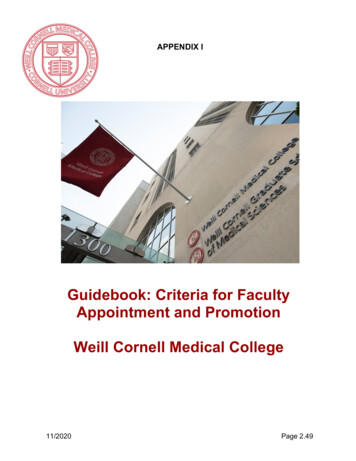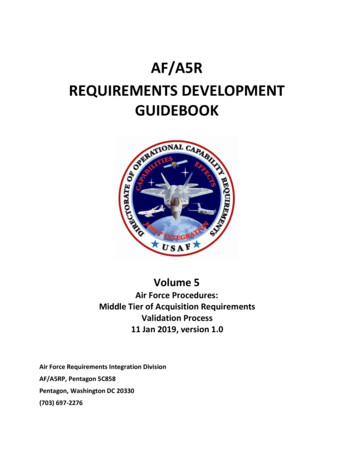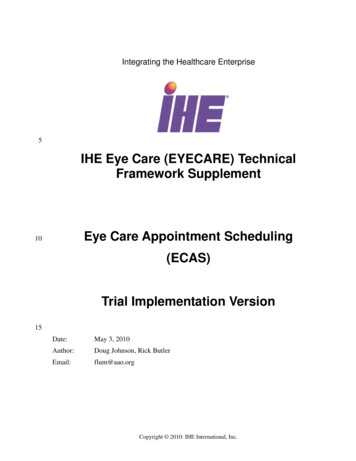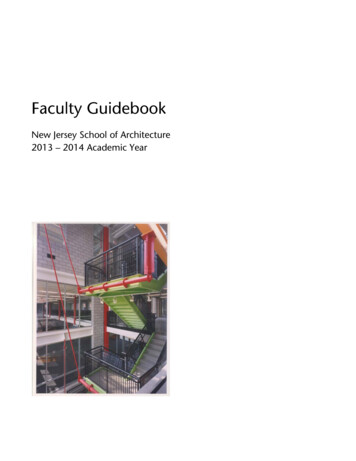
Transcription
APPENDIX IGuidebook: Criteria for FacultyAppointment and PromotionWeill Cornell Medical College11/2020Page 2.49
TABLE OF roductionSteps Towards Promotion:Selecting an Area of ExcellenceCreating a Promotion ProfileSelecting a PathwayAcademic Achievement and ScholarshipClinical ExcellenceExcellence in InvestigationTeaching ExcellenceDescription of Areas of Excellence:Clinical Expertise & InnovationDescription of Areas of Excellence:InvestigationDescription of Areas of Excellence:Educational LeadershipExcellence in InvestigationTeaching ExcellenceEvaluation for Teaching ActivitiesEvaluation for Mentoring ActivitiesSignificant Supporting ActivitiesLonger Service CriteriaLecturersInstructorsNon-Professorial FacultyAffiliate Clinical FacultyVoluntary FacultyFAQsResourcesLetters from 42.962.992.1022.103Page 2.50
INTRODUCTIONThis guidebook describes the criteria for faculty appointment and promotion at WeillCornell Medical College. Under these guidelines, faculty are given the opportunity toassemble a profile that reflects their unique combination of activities andaccomplishments. This structure also includes administrative leadership and service tothe Weill Cornell community that contributes to the academic mission to the MedicalCollege. This system permits the total activities and achievements of a faculty memberto be considered in the evaluation for promotion.The fundamental concepts of the criteria include:1.2.3.demonstration of excellence in the major area of academic activity by objectiveachievements.requirement for scholarship, teaching, and mentoring activity at all ranksexcept for promotion to Assistant Professora link between rank of appointment and the breadth of the candidate’sreputation and achievement. Appointment as Associate Professor requires astrong regional reputation and appointment as Professor requires a sustainednational, and in many cases international, reputation.A key aspect of this system is to incorporate objective criteria that recognize new modelsof investigation and clinical care, and innovation in education and administration.This booklet is intended to assist faculty in understanding the requirements forpromotion, with an overview of the new criteria (pages 2.53-58), followed by sectionsthat detail the metrics for promotion for faculty members with areas of excellence ininvestigation, clinical expertise or educational leadership (pages 2.59-83).This is followed by metrics of teaching activities (pages 2.84-86), metrics of mentoringactivities (pages 2.87), and metrics of supporting activities (pages 2.88-91)The final section includes resources for additional information and a “frequently askedquestions” section tailored to common areas for clarification (pages 2.99-101).This guidebook has been designed to provide examples of metrics, and to addressquestions that are frequently raised by faculty regarding promotion. The Academic -policies/academic-staff-handbook remains themore comprehensive source for all general policies that pertain to faculty affairs.11/2020Page 2.51
TenureThis guidebook does not change or modify the Cornell University or Weill CornellMedical College policies regarding tenure. Further information regarding tenure can befound in the Academic Staff Handbook, “Tenure” (section 3).11/2020Page 2.52
STEPS TOWARD PROMOTION:SELECTING AN AREA OF EXCELLENCEThe area of excellence should represent the candidate’s major area of achievement andimpact, including a consideration of the quantity as well as quality of contribution. Thearea of excellence should form the basis of the candidate’s reputation and should beconsistent with the type and focus of the candidate’s scholarship. The area of excellenceshould also represent the activities to which the faculty member has devoted asubstantial proportion of time and academic effort. The choice may also be influencedby how the candidate views his/her career path. The determination of the area ofexcellence is made by the Department Chair (or his/her designee) in consultation withthe candidate.In most cases, an individual will maintain a consistent academic focus over time,although the activities of a faculty member may occasionally change. If a substantivechange in activities occurs, the area of excellence and significant supporting activitiesselected for subsequent promotions may change as well. The candidate will be expectedto meet the standards for the new area of excellence.Almost all candidates will be evaluated in a single area of excellence. Only rarely, whenboth the quality and quantity of contribution are comparable in two areas of excellenceshould two areas of excellence be proposed.11/2020Page 2.53
STEPS FOR CREATING A PROMOTION PROFILE11/2020Page 2.54
SELECTING A PATHWAYThe Weill Cornell Promotion System utilizes two major types of pathwaysThe first type of pathway is for faculty members for whom academic achievementand scholarship is a primary activity. Individuals in this category hold unmodifiedtitles. (Detailed on page 2.56)The second type of pathway is for faculty members for whom clinical expertise,investigation, or teaching excellence will be the primary criteria for promotion.Scholarship and administrative expertise are recognized, but are not the primaryconsiderations for promotion. Individuals in this category will hold modified titles.(Detailed on pages 2.57-2.58)The decision regarding the most relevant pathway for each faculty member is a jointdecision reached between the faculty member and the Departmental Chairperson.Pathways will be noted in initial offer letters, and will be reviewed yearly during AnnualFaculty Reviews.We will describe the Pathway Recognizing Academic Achievement and Scholarship(Page 2.56), followed by the pathways that recognize Clinical Expertise, Investigation,and Teaching Excellence (page 2.57-2.58).11/2020Page 2.55
A. PATHWAY RECOGNIZING ACADEMICACHIEVEMENT AND SCHOLARSHIPStep 1. Select one of the three Areas of Excellence (required)1. Clinical Expertise and Innovation2. Investigation3. Educational LeadershipThe area of excellence should represent the candidate’s major area of achievement andimpact. This area should form the basis of the candidate’s reputation and recognition.Scholarship, broadly defined, is a requirement in all categories. The area of excellencemay be different at subsequent promotions; hence there is flexibility to permit thepromotion of faculty members who have actively sought career changes from one areaof excellence to another.Step 2. Report on Teaching and Mentoring Activities (required, pages 2.84-87)All faculty members will be evaluated for contributions to teaching, education, andmentoring activities at WCMC and affiliated institutions. If this is the candidate’s firstfaculty appointment at WCMC, teaching contributions and mentorship at institutionswhere the candidate previously held a faculty position will also be considered. Teachingand mentoring activities are broadly defined to include: Didactic teaching of students, trainees and peers Research training and mentorship Clinical teaching and mentorship Administrative teaching roles Teaching of WCMC medical and graduate students, students in WCMCapplied programs (Physician’s Assistants) should be particularly noted One-to-one, small group, or large group workshops or lectures, whichcover any topic directly related to a mentee’s career developmentStep 3. Specify Significant Supporting Activities (optional, pages 2.88-91)Many faculty members make significant contributions outside their designated area ofexcellence and teaching. Significant supporting activities may represent contributions ofoutstanding quality in areas in which the quantity of contribution is less than in the areaof excellence. Contributions in five areas will be considered: Clinical Expertise Investigation Education of Patients and Service to the Community Administration and Institutional Service External Professional ActivitiesSubstantial academic contributions in one or more supporting activities will supplementaccomplishments in the area of excellence, in evaluation for promotion. However, whilesuch activities may decrease the expected quantity of contribution in the area of11/2020Page 2.56
excellence, they do not diminish the requirement for exceptional quality of academicachievement in the area of excellence.Tenure Consideration: Select faculty on the Pathway Recognizing AcademicAchievement and Scholarship, usually for whom Investigation is the Area of Excellencemay be eligible for tenure consideration. For these faculty members, evaluation forpromotion to Associate Professor is required generally not later than the sixth year asan Assistant Professor, followed by consideration for tenure at year eight, with or withoutfurther promotion. Eligibility for tenure consideration is typically noted in initial offerletters, and can be further discussed with Division Chief and Department Chairs duringthe Annual Faculty Review. The details for tenure consideration are further delineatedin the Tenure section of the Weill Cornell Academic Staff Handbook.B. PATHWAY RECOGNIZING CLINICAL EXCELLENCE:Step 1. The area of clinical excellence should represent the candidate’s major area ofachievement and impact. This area should form the basis of the candidate’s reputationand recognition. Scholarship, broadly defined, is a requirement, but the quantity ofscholarship is typically less than that of faculty on the Pathway Recognizing AcademicAchievement.Step 2. Report on Teaching and Mentoring Activities (required). (Pages 2.84-87)Step 3. Specify Significant Supporting Activities (optional). (Pages 2.88-91)C. PATHWAY RECOGNIZING EXCELLENCE ININVESTIGATION:Step 1. The area of excellence in scientific investigation should represent thecandidate’s major area of achievement and impact. This area should form the basis ofthe candidate’s reputation and recognition. Scholarship, broadly defined, is arequirement, but the quantity of scholarship is typically less than that of faculty on thePathway Recognizing Academic Achievement.Step 2. Report on Teaching and Mentoring Activities (required). (Pages 2.84-87)Step 3. Specify Significant Supporting Activities (optional). (Page 2.88-91)11/2020Page 2.57
D. PATHWAY RECOGNIZING EXCELLENCE INTEACHING:Step 1. The area of excellence in teaching should represent the candidate’s major areaof achievement and impact. This area should form the basis of the candidate’s reputationand recognition. Scholarship, broadly defined, is a requirement, but the quantity ofscholarship is typically less than that of faculty on the Pathway Recognizing AcademicAchievement.Step 2. Report on Teaching and Mentoring Activities (required). (Pages 2.84-87)Step 3. Specify Significant Supporting Activities (optional). (Pages 2.88-91)11/2020Page 2.58
DESCRIPTION OF AREAS OF EXCELLENCEClinical Expertise and InnovationThis section covers Weill Cornell Medical College academic titles and promotionscriteria for all faculty members for whom patient care and other clinically-relatedactivities constitute the unifying theme for the candidate’s academic activities andachievements.For Full-time and Regular Part-time Weill Cornell Medical College FacultymembersPathway Recognizing Academic Achievement and ScholarshipUnmodified Titles in Clinical Departments; award of these titles must includesubstantial activity in Written Scholarship and TeachingAvailable Titles include Assistant Professor of (Department), Associate Professor of(Department), and Professor of (Department). In certain circumstances, the titleInstructor in Discipline may also be awarded (see below).To be considered for an unmodified title at any level, the candidate will be assessed onthe basis of clinical excellence and leadership, scholarship, and teaching. The candidatemay have a reputation as an innovator in approaches to diagnosis, treatment orprevention of disease, applications of technology to clinical care and/or in developingmodels of care delivery. With specific regard to clinical excellence and leadership, anassessment will be performed regarding both the candidate’s recognition as a clinicalexpert as well as the candidate’s influence on clinical practice; level specific metrics forboth recognition and influence are provided within the attached table. The candidatemust also demonstrate written scholarship, which may include chapters and reviews inthe area of clinical expertise, guidelines for patient care, publications evaluating theimpact of a clinical innovation and/or other research publications (for scholarship metricsfor unmodified titles, the attached Metrics for Scholarship Table is used; other forms ofscholarship are considered supplemental and do not replace the requirements forwritten scholarship in the Metrics for Scholarship Table). There should be a strongteaching and mentoring component in the clinical field (for metrics, see attachedTeaching Tables, pages 2.84-86 and Mentoring Table, page 2.87) and the individualmay participate in clinical, translational, or basic scientific research related to the clinicalfield.At the Assistant Professor level, the candidate must have evidence of (or a clearpotential for, if an initial appointment) a strong local reputation in a clinical field with aleadership role and/or a key role in activities that influence practice, such as approachesto diagnosis, treatment or prevention of disease, applications of technology to clinicalcare and/or development or local adoption of innovative models of care delivery. The11/2020Page 2.59
candidate must have (or a clear potential for, if an initial appointment) first authorscholarship related to the clinical field and should be teaching in the clinical field.For appointment as, or promotion to Associate Professor of (Department), thecandidate must have (in addition to distinguished service as an assistant professor) astrong regional, and frequently national, reputation as an independent expert who hasinfluenced the clinical field. He/she may have demonstrated innovation in approachesto diagnosis, treatment or prevention of disease, the development/application oftechnology for clinical care and/or the development of novel models of care delivery thatinfluence care at a regional, and often national, level. The candidate must have an activeteaching role and have influential first and senior author scholarship in the area of clinicalexpertise.For appointment as, or promotion to Professor of (Department), the candidate musthave (in addition to distinguished service as an associate professor) a sustainednational, and in many cases international, reputation as a leader and innovator in aclinical field. The candidate’s expertise must be demonstrated through high impactscholarship. The candidate must have a significant influence on practice in the clinicalfield nationally, and often internationally, as a result of his/her teaching, scholarship andinnovation.For Full-time and Regular Part-time Weill Cornell Medical College FacultymembersPathway Recognizing Clinical ExcellenceModified Titles in Clinical Departments; award of these titles may includesubstantial activity in Scholarship and TeachingAward of a modified title the pathway recognizing clinical excellence does not requirethe same measure of written scholarship, teaching, or mentoring as an unmodified titlealthough these activities are included in every assessment and are strongly encouragedthroughout the medical college. With regard to scholarship and teaching metrics forcandidates for a modified title, it is important to note that the evaluation will also considerthe more broadly defined metrics given in the Recognition and Scholarship Metrics inTeaching and Education Table below and are not limited to those in the Metrics forScholarship Table (which emphasizes written scholarship). In addition, although allcandidates for a modified title will also be evaluated for teaching and mentoringaccording to the attached tables, it is recognized that certain clinical settings mayprovide a limited opportunity for educational activities.Available Titles include Assistant Professor of Clinical (Department), AssociateProfessor of Clinical (Department), and Professor of Clinical (Department). In certaincircumstances, the title Instructor in Clinical (Department) may also be awarded (seebelow).To be considered for a modified title at any level, the candidate will be assessed onthe basis of clinical excellence and leadership, scholarship, and teaching. With specific11/2020Page 2.60
regard to clinical excellence and leadership, an assessment will be performedregarding both the candidate’s recognition as a clinical expert as well as thecandidate’s influence on clinical practice; level specific metrics for both recognition andinfluence are provided within the table below. The candidate may have a reputation asa provider or innovator in approaches to diagnosis, treatment or prevention of disease,applications of technology to clinical care and/or in developing models of care delivery.Consequently, there may be candidates who are primarily or exclusively clinical in focusfor whom none of the teaching and education criteria pertain; these candidates may stillbe considered for a modified title based on clinical excellence and leadership criteriaalone.At the Assistant Professor of Clinical (Department) level, the candidate must haveevidence of (or a clear potential for, if an initial appointment) a strong local reputation asan expert in a clinical field and must have demonstrated clinical expertise that isrecognized for its reliable high quality. While not absolutely required for appointment,the documentation of (or potential for, if an initial appointment) scholarship (metrics fromboth tables: Metrics for Scholarship and Recognition and Scholarship Metrics inTeaching and Education) and/or meeting the level specific teaching and educationminimum standards where possible, will be valued.For appointment as, or promotion to Associate Professor of Clinical (Department),the candidate must have (in addition to distinguished service as an assistant professor)a strong regional reputation as an expert who is highly regarded in a clinical field andmust have demonstrated clinical expertise that is consistently outstanding. While notabsolutely required for appointment, the documentation of scholarship (metrics fromboth tables: Metrics for Scholarship and Recognition, and Scholarship Metrics inTeaching and Education) and/or meeting the level specific teaching and educationminimum standards where possible, will be valued.For appointment as, or promotion to Professor of Clinical (Department), the candidatemust have (in addition to distinguished service as an associate professor) a sustainednational or international reputation as an expert who has achieved exceptionalproficiency in a clinical field and must have demonstrated clinical expertise that isconsistently distinguished by the depth and breadth of attainment. While not absolutelyrequired for appointment, the documentation of scholarship (metrics from both tables:Metrics for Scholarship and Recognition, and Scholarship Metrics in Teaching andEducation) and/or meeting the teaching and education minimum standards wherepossible, will be valued.11/2020Page 2.61
Clinical Expertise & InnovationMetrics for Recognition as a Clinical Expert and for InfluencingClinical Practice:Assistant ProfessorThe metrics provided for each area of excellence in the following sections are notcomprehensive but are meant to serve as examples of common achievements fora given rank. Candidates may report achievements not specified in the metrics.At initial appointment, faculty members are evaluated for potential in attaining thesemetrics. During their Assistant Professorship, faculty members should provide evidenceof attaining one or more of these metrics.Assistant ProfessorExamples of MetricsRecognition as aclinical expertStrong local reputation as a clinical expert, may hold local clinicalleadership roles.Specific metrics Invitations to speak locally, and in many cases regionally, on issuesrelated to area of clinical expertise Role in local professional organizations related to clinical expertise,including participation as a speaker in courses and programdevelopment Invitations to participate locally in the development ofguidelines/protocols for quality improvement or management in areaof clinical expertise Service as peer reviewer for clinical journals Peer-reviewed funding to support innovations that influence clinicalpractice locally Local awards for contributions and/or innovation in the area of clinicalexpertiseInfluencing clinicalpracticeWritten Scholarship11/2020Key role in the development or local adoption of innovative approaches todiagnosis, treatment or prevention of disease, use of technologies and/ormodels of care delivery. Examples of activities (many others are possible)include: Assisting with the creation of a novel interdisciplinary clinical service Key role in development and local implementation of practiceguidelines for care or to prevent medical errors Utilizing and disseminating the use of a new surgical procedure Publication of first author original research, reviews and/or chaptersrelated to area of clinical expertise; may include publication ofresearch that assesses the effectiveness of innovative approaches toclinical care Development of guidelines and/or protocols for patient treatment ordelivery of care that are adopted locallyPage 2.62
Clinical Expertise & InnovationMetrics for Recognition as a Clinical Expert and for InfluencingClinical Practice:Associate ProfessorThe metrics provided for each area of excellence in the following sections arenot comprehensive but are meant to serve as examples of commonachievements for a given rank. Candidates may report achievements notspecified in the metrics.Associate ProfessorExamples of MetricsRecognition as aclinical expertStrong regional, and most often national, recognition as an independentclinical expert as evidenced by regional and/or national leadership rolesand reputation related to the clinical field.Specific metrics Invitations to speak regionally, and most often nationally, on issuesrelated to area of clinical expertise Leadership roles in regional, and most often national, professionalorganizations related to clinical expertise, including leadership inregional and/or national courses or programs Service on regional, and most often national, committees developingguidelines and policies for management in area of clinical expertise Service on regional, and most often national, committees evaluatingprograms in area of clinical expertise Membership on editorial boards in area of clinical expertise Peer-reviewed funding to support innovations that influence clinicalpractice regionally, and most often nationally Regional and/or national awards for contributions and/or innovationin the area of clinical expertiseInfluencing clinicalpracticeDevelopment of innovative approaches to diagnosis, treatment orprevention of disease, applications of technologies and/or models of caredelivery that influence care at a regional, and most often national, level.Examples of activities (many others are possible) include thedevelopment of: a clinical care model practice guidelines an innovative application of an existing technology Publication of first and senior author original research, chapters,reviews, and/or textbooks related to area of clinical expertise that arerecognized as authoritative and are widely cited Development of guidelines and/or protocols for patient treatment ordelivery of care that are adopted regionally, and in some cases,nationally Publication of first and senior author manuscripts that demonstratethe impact of the candidate’s innovation on quality of care, clinicaloutcomes, and/or access to careWritten Scholarship11/2020Page 2.63
Clinical Expertise & InnovationMetrics for Recognition as a Clinical Expert and for InfluencingClinical Practice:ProfessorThe metrics provided for each area of excellence in the following sections arenot comprehensive but are meant to serve as examples of commonachievements for a given rank. Candidates may report achievements notspecified in the metrics.ProfessorExamples of MetricsRecognition as aclinical expertNational, and in many cases international, recognition as a clinical expertas evidenced by national, and in many cases international, leadershiproles and reputation related to the clinical field,Specific metrics Visiting professorships and invitations to speak nationally, and inmany cases internationally, on issues related to area of clinicalexpertise Leadership roles in national, and in many cases international,professional organizations related to area of clinical expertiseincluding leadership of national, and in many cases international,courses or programs Service as a consultant on issues related to area of clinical expertise Service on national, and in many cases international, committeesdeveloping guidelines and policies for management or evaluatingprograms in area of clinical expertise Editor of a journal in the area of clinical expertise Peer-reviewed funding to support innovations that influence clinicalpractice nationally, and in many cases, internationally National, and in many cases international, awards for contributionsand/or innovation in the area of clinical expertiseInfluencing clinicalpracticeDevelopment of innovative approaches to diagnosis or treatment,applications of technologies and/or models of care that influence care ata national, and in many cases international, level. Examples of activities(many others are possible) include: Having a critical role in defining a new field Developing innovative treatments, procedures, or technologiesdemonstrated to be superior to previous approaches Developing treatment protocols or practice guidelines that influencethe standard of careWritten Scholarship 11/2020Publication of first and senior author original research, chapters,reviews, and/or textbooks related to area of clinical expertise that arerecognized as authoritative and are widely citedDevelopment of guidelines and/or protocols for patient treatment ordelivery of care that are adopted regionally, and in some cases,nationallyPublication of first and senior author manuscripts that demonstratethe impact of the candidate’s innovation on quality of care, clinicaloutcomes, and/or access to carePage 2.64
InvestigationThis area of excellence is appropriate for individuals who spend the majority of their timeperforming research. Investigation is broadly defined to include basic, translational andclinical research, including epidemiology, outcomes and health services research, andbiostatistics as well as research in social sciences, ethics, bioinformatics and healtheconomics, among others. Investigation also includes the development of innovativemethods/technologies and/or novel applications of existing methods and technologies.This area of excellence may also be used to recognize the contributions of individualswith research training in diverse fields who bring a unique or critical expertise to thebiomedical research team. It includes individuals participating in large collaborative andmulticenter research, as well as those conducting research individually or in smallgroups. The candidate must demonstrate scholarship, which may include first or seniorauthor publications of original research, and/or publications from large multidisciplinarystudies on which the candidate was in another authorship position and to which thecandidate made documented, significant intellectual contributions.Pathway Recognizing Academic Achievement and ScholarshipUnmodified Titles in Department; award of these titles must include substantialactivity in Written Scholarship and TeachingAt the Assistant Professor level, the candidate must have evidence of a strongreputation for contributions to research with an identified research focus or area ofexpertise. He/she must demonstrate scholarship which most often includes publicationson which the candidate is first author; the candidate may also be in another authorshipposition on publications from collaborative research to which he/she has madedocumented, substantive intellectual contributions.For appointment as, or promotion to Associate Professor of (Department), thecandidate must have a national reputation as an independent investigator and majorcontributor to the field. There must be a record of independent scholarship which nearlyalways will include senior authorship on high quality publications that have advancedthe field; the candidate may also be in another authorship position on publications fromcollaborative research that significantly advance biomedical science to which he/shecontributed critical ideas or innovations, having taken the role of first or senior author onsome publications. The candidate should have a successful record of peer-reviewedextramural funding, and must have evidence of teaching and supervision of trainees.For appointment as, or promotion to Professor of (Department), the candidate musthave a sustained international reputation as one of the top researchers in the field.He/she must be the leader of an exceptional independent research program and mayalso have key leadership roles in collaborative studies. The candidate must have alongstanding record of exceptional scholarship, which includes senior authorship onhigh impact publications of original research. The candidate may also have played aleadership role on, and made critical contributions to, publicatio
Step 2. Report on Teaching and Mentoring Activities (required, pages 2.84-87) All faculty members will be evaluated for contributions to teaching, education, and mentoring activities at WCMC and affiliated institutions. If this is the candidate's first faculty appointment at WCMC, teaching contributions and mentorship at institutions










